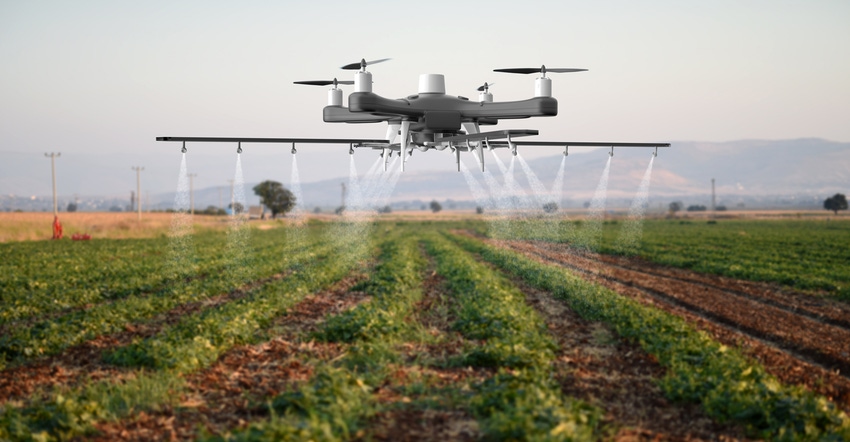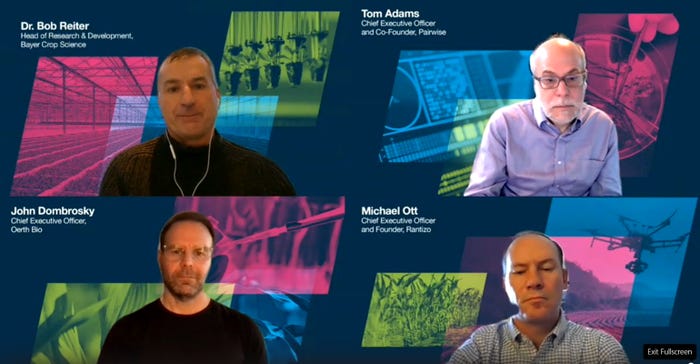
Never underestimate the power of a small company to make a big difference in agriculture.
During a recent Future of Farming Dialogue sponsored by Bayer, three agriculture technology companies shared their progress from humble beginnings as a startup. Here are a few interesting advancements on the horizon in the areas of equipment, food and biotech.
Self-service drone
Rantizo, an Iowa-based company using drones to spray crop protection chemicals in 18 states, is launching an automated drone. How can a drone that flies itself be more autonomous? This one will mix and fill itself.
“So, when the drones come back, they'll actually reload themselves,” says Michael Ott, Rantizo CEO and founder. “We have the first version of that coming out very soon in the next couple of weeks, and then we'll continue to improve upon that as we go.”
This drone spraying system allows farmers to use less chemicals and water. Ott explains that the low-volume formulations reduce the amount of water required for application. In corn, farmers could use a 2- to 3-gallons-per-acre rate with drones compared to 10 to 20 gallons with traditional field spraying equipment.
When it comes to fruits such as strawberries, where growers put on about 200 gallons of water per acre, Otto adds, the reduction is huge. “When you’ve got a precise way to [deliver product], you can get that same level of coverage with much less. So, the biggest benefit is that we can put the ag inputs, precisely where they're needed, when they're needed.”
Look for this automated drone mix-and-fill system in fields this spring.
Brand-new vegetable
Pairwise, a North Carolina-based company whose mission is to drive human health by reducing barriers to eating fruits and vegetables, will introduce a new vegetable for consumer’s salad bowls.
Tom Adams, co-founder and CEO at Pairwise, says the company used gene editing and genetic breeding to create a novel leafy green. It boasts the health properties of kale with the texture and eating properties of romaine lettuce.
He says the company is finding a place in the fruit and vegetable market by using genetics to create products where “everybody in the supply chain wins from the grower to the consumer, while not having to give up flavor for shelf life.” Expect to see this green in 2022.
Environmental footprint reducer
Oerth Bio, another startup that is part of the Leaps by Bayer program, is using a protein degradation platform to protect crops from weeds, insects and diseases, potentially decreasing the need for chemical crop protection and ultimately reducing the environmental impact of agriculture.
“The next 10 years of agricultural innovation will have an outsized impact on the long-term health of our global food system,” says John Dombrosky, CEO of Oerth Bio. His company is working to reduce agriculture’s environmental impact and footprint through a therapeutic platform called Proteolysis-Targeting Chimera, or PROTAC.
PROTAC works at the cell level to selectively remove target proteins by breaking them into amino acids. Targeted protein degraders could be predesigned for specific safety or efficacy elements for specific species, crops or environmental benefits, while not giving up but even accelerating some of the power that comes from synthetic crop protection chemistry, Dombrosky adds.
Protein degradation is already used in the health care industry, but it is now finding its way into agriculture.
Read more about how Bayer helped these small tech companies grow.
Advice from agriculture startup execs
Thinking of starting your own agriculture company? Four executives offered sage advice to the next generation of startup entrepreneurs during a recent Bayer Future of Farming Dialogue.
Here are their bits of wisdom:
“Set up systems that benefit everyone.” — Michael Ott, Rantizo CEO
“Have a purpose.” — Tom Adams, Pairwise CEO
“You’re gonna fail. Deal with it and move on.” — John Dombrosky, Oerth Bio CEO
“Think bigger than you are. Aspire to something even bigger than even you can imagine.” — Bob Reiter, Bayer Crop Science head of research and development

TECH PIONEERS: A group of small startup company executives took part in Bayer’s Future of Farming Dialogue and shared one piece of advice to the next generation of entrepreneurs.
About the Author(s)
You May Also Like






